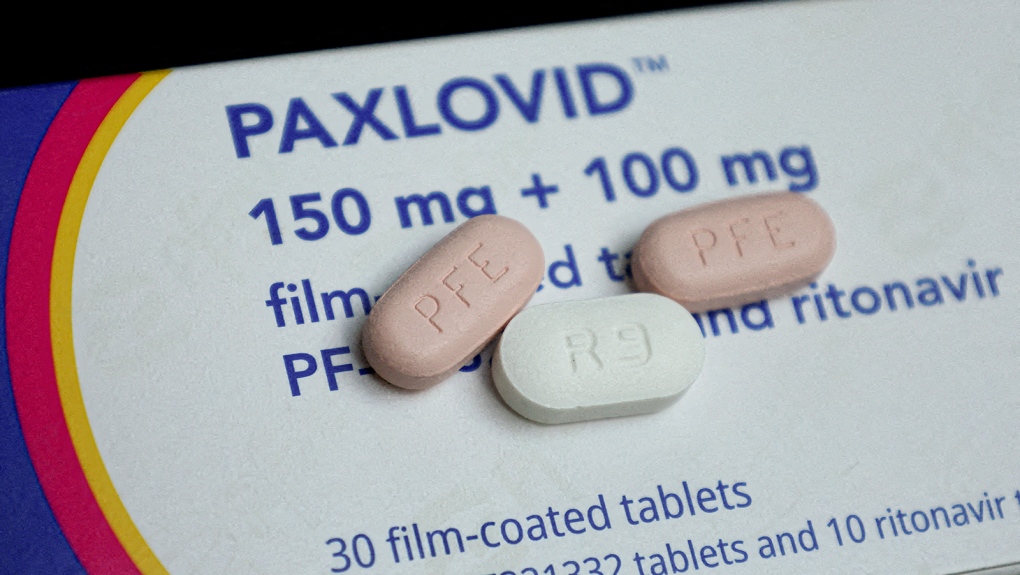Health Canada drops Paxlovid coverage, Albertans on the hook for the bill
 A morning and evening dose of Paxlovid is shown in an undated photo. According to Alberta pharmacists a five-day supply of the drug will cost Albertans more than $1,400. (Supplied)
A morning and evening dose of Paxlovid is shown in an undated photo. According to Alberta pharmacists a five-day supply of the drug will cost Albertans more than $1,400. (Supplied)
Health Canada ended federal coverage of Paxlovid, a COVID-19 drug for immunocompromised patients, making coverage a provincial responsibility.
While some provinces are taking over coverage, Alberta patients may be paying more than $1,400 per treatment.
During the COVID-19 pandemic, Paxlovid, a drug for immunocompromised individuals, was covered by Health Canada on an emergency basis.
While private insurance may cover some of the cost, Albertans could now have to pay around $1,450 for the five-day supply of the drug, according to Alberta Health and confirmed by Pincher Creek Pharmasave.
As of the end of May, the Public Health Agency of Canada has discontinued coverage, now making the drug a provincial responsibility.
- Sign up for breaking news alerts from CTV News, right at your fingertips
- The information you need to know, sent directly to you: Download the CTV News App
Health and pharmaceutical care in Canada is a joint venture between federal and provincial levels, with federal agenda setting and provincial implementation.
The Government of Alberta will cover the cost of Paxlovid for Albertans who have a government-sponsored drug plan, are immunocompromised and COVID-positive, according to a media response from Andrea Smith, Alberta Health's press secretary.
The coverage is listed by Alberta Blue Cross as restricted benefit with special authorization, meaning provincial plans for seniors would cap the patient's cost at $25, with plans like income support and child and adult health benefits still seeing full coverage.
Some employer-sponsored plans may provide partial coverage, but depending on co-pay could still see patients paying large amounts for the treatment.
The province said pharmacists were only notified of this change on May 24 and physicians on May 30.

According to the Centers for Disease Control and Prevention, a person's immune response to having COVID-19 can protect them from reinfection for several months, but protection decreases over time.
Those with weak immune systems may have a limited immune response or none at all. This can result in hospitalization due to severe illness, and even death.
New variants can bypass existing immunity and increase infection risk.
Although rare, reinfection can occur as early as several weeks after a bout with the virus.
Pincher Creek resident Shannon Peace is recovering from her third run-in with COVID-19.
The first was in 2022, while the latter were contracted in March and May of this year.
With her immunity weakened by a daily dose of a chemotherapy drug that treats a rare blood disorder, Peace has done what she can to avoid contracting the virus since the onset of the pandemic. Asthma is a further complicating factor for her.
In 2022, she was treated with Paxlovid at the onset of symptoms.
 Paxlovid, Pfizer's anti-viral medication to treat Covid. (Wolfgang Rattay/Reuters)
Paxlovid, Pfizer's anti-viral medication to treat Covid. (Wolfgang Rattay/Reuters)
According to Health Canada, Paxlovid — brand name for a combination of nirmatrelvir and ritonavir — stops the virus from multiplying.
Once treatment begins, a patient's symptoms should not get worse as the drugs help the body fight the viral infection.
Paxlovid treatment was relatively new at the time and Peace was advised not to take any pain relievers or decongestants. She felt miserable for about two weeks but believes it would have been worse without the drug.
Fast-forward to this spring when fever and chills knocked Peace out of commission and a home test was positive for COVID-19.
"My daughter reminded me that it was a rough go the first time so I consulted with 811 a number of times before choosing to forego a trip to the ER requesting treatment," Peace says.
"I monitored my oxygen level and temperature, and promised the RNs I spoke with to go in if I went past certain thresholds."
She wound up spending three full weeks in bed, sleeping up to 20 hours a day.
Symptoms gradually subsided but fatigue and some breathing changes persisted.
"It was a complete shock to test positive again only two months later," she said. "I hadn't fully recovered yet when I got sick again in May."
After conferring with 811 and her local physician, Peace was referred to the COVID-19 treatment centre.
"At each step of the consultation, it was stressed that I would be responsible to pay for the Paxlovid prescription and to confirm with the pharmacist what that amount would be," Peace said.
"This was the first I heard that the drug was no longer being covered by Alberta Health."
Fortunately for her, the prescription was filled the day before the change came into effect so there was no charge for the medication.
"While it was awful and I was still slow to recover, it was night and day compared to what I went through in March," she said.
"The medication absolutely makes a difference for me."
Peace contacted pharmacist Amber Shepherd at Pincher Creek Pharmasave to find out what the medication would have cost and was astonished to learn that the five-day treatment would be more than $1,400 the next time it's needed.
"Amber was great with getting things looked after for me when it came to filling the prescription and helpful in providing a look at what will happen the next time I catch COVID-19," Peace said.
“She ran a test with my group insurance, which is through the Alberta Chamber of Commerce, and was able to tell me that half of the amount will be covered.
"This will leave me with a big decision if I get sick again — do I forego treatment or fork out more than $700? That's a tough question," she said.
"What happens when we don't have the option to afford treatment?"
This is a concern for her and for others, especially as there has been no public notification of the change.
Shepherd has not yet seen new prescriptions after the change in coverage, but worries about what this will mean for local patients.
"If they're not covered, it's a big impact because you have to decide between eating and whether or not you get the medication," she said.
"It's certainly going to make people think twice about accessing the medication and potentially going without to make sure they can still live, basically."
 This image provided by Pfizer shows the company's COVID-19 Paxlovid pills. (Pfizer via AP, File)
This image provided by Pfizer shows the company's COVID-19 Paxlovid pills. (Pfizer via AP, File)
Shepherd encourages anyone with questions or concerns about coverage to reach out to any pharmacy to confirm accessibility of the drug to them.
"It's just going to be a case-by-case basis," Shepherd said.
Peace acknowledges that the COVID-19 pandemic has had a hefty price tag for everyone but is concerned that the cost of treatment skyrocketing for those who are immunocompromised will have a different expense in terms of severe outcomes.
CTVNews.ca Top Stories

Quebec man, 81, gets prison sentence after admitting to killing wife with Alzheimer's disease
An 81-year-old Quebec man has been sentenced to prison after admitting to killing his wife with Alzheimer's disease.
Canada Post quarterly loss tops $300M as strike hits second week -- and rivals step in
Canada Post saw hundreds of millions of dollars drain out of its coffers last quarter, due largely to its dwindling share of the parcels market, while an ongoing strike continues to batter its bottom line.
'Immoral depravity': Two men convicted in case of frozen migrant family in Manitoba
A jury has found two men guilty on human smuggling charges in a case where a family from India froze to death in Manitoba while trying to walk across the Canada-U.S. border.
Prime Minister Trudeau attends Taylor Swift's Eras Tour in Toronto with family
Prime Minister Justin Trudeau is a Swiftie. His office confirmed to CTV News Toronto that he and members of his family are attending the penultimate show of Taylor Swift's 'The Eras Tour' in Toronto on Friday evening.
Trump supporters review-bomb B.C. floral shop by accident
A small business owner from B.C.'s Fraser Valley is speaking out after being review-bombed by confused supporters of U.S. president-elect Donald Trump this week.
Pat King found guilty of mischief for role in 'Freedom Convoy'
Pat King, one of the most prominent figures of the 2022 'Freedom Convoy' in Ottawa, has been found guilty on five counts including mischief and disobeying a court order.
Nearly 46,000 electric vehicles recalled in Canada over power loss risk
Nearly 46,000 electric vehicles from Kia, Hyundai and Genesis are being recalled in Canada over a potential power loss issue that can increase the risk of a crash.
Trump chooses Bessent to be Treasury secretary and Vought as top budget official
President-elect Donald Trump announced Friday that he'll nominate hedge fund manager Scott Bessent, an advocate for deficit reduction, to serve as his next treasury secretary. Trump also said he would nominate Russel Vought to lead the Office of Management and Budget.
Canada's tax relief plan: Who gets a cheque?
The Canadian government has unveiled its plans for a sweeping GST/HST pause on select items during the holiday period. The day after the announcement, questions remain on how the whole thing will work.


































